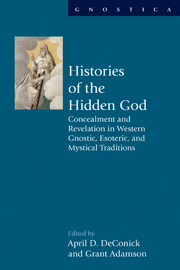 Histories of the Hidden God
Histories of the Hidden God Book contents
- Frontmatter
- Contents
- Acknowledgments
- Contributors
- Introduction: In search of the hidden God
- Part I Concealment of the Hidden God
- 1 Who is hiding in the Gospel of John? Reconceptualizing Johannine theology and the roots of Gnosticism
- 2 Adoil outside the cosmos: God before and after Creation in the Enochic tradition
- 3 The old gods of Egypt in lost Hermetica and early Sethianism
- 4 Hidden God and hidden self: The emergence of apophatic anthropology in Christian mysticism
- 5 God's occulted body: On the hiddenness of Christ in Alan of Lille's Anticlaudianus
- Part II The Human Quest for the Hidden God
- Part III Revelations of the Hidden God
- Afterword: Mysticism, Gnosticism, and esotericism as entangled discourses
- Bibliography
- Index
4 - Hidden God and hidden self: The emergence of apophatic anthropology in Christian mysticism
from Part I - Concealment of the Hidden God
- Frontmatter
- Contents
- Acknowledgments
- Contributors
- Introduction: In search of the hidden God
- Part I Concealment of the Hidden God
- 1 Who is hiding in the Gospel of John? Reconceptualizing Johannine theology and the roots of Gnosticism
- 2 Adoil outside the cosmos: God before and after Creation in the Enochic tradition
- 3 The old gods of Egypt in lost Hermetica and early Sethianism
- 4 Hidden God and hidden self: The emergence of apophatic anthropology in Christian mysticism
- 5 God's occulted body: On the hiddenness of Christ in Alan of Lille's Anticlaudianus
- Part II The Human Quest for the Hidden God
- Part III Revelations of the Hidden God
- Afterword: Mysticism, Gnosticism, and esotericism as entangled discourses
- Bibliography
- Index
Summary
The notion of a God who hides himself, either because that is a fundamental characteristic of the divine nature, or because God chooses to do so in relation to human attempts to know him, is widespread in many religious traditions. In the history of Christian theology this hiddenness has often been expressed as “apophatic theology” (the Greek apophasis literally means “unsaying”). For Christians the contention that at least in this life the mystery of God is better known by not-knowing than by knowing has roots in the Hebrew bible/Old Testament, as well as the New Testament, especially in those texts that speak of God's hiddenness. “Truly, you are a God who hides himself, O God of Israel, the Savior,” as Isaiah proclaims (Isa. 45:15). Though there is disagreement in the Hebrew Bible about whether God can ever really be seen, with some texts affirming the possibility (e.g. Gen. 32:30; Isa. 6:5), while others deny it (e.g. Exod. 33:20), there is no question in the New Testament about the radical invisibility of the Father. John's prologue says, “No one has ever seen God. It is God the only Son, who is close to the Father's heart, who has made him known” (John 1:18). The deutero-Pauline 1 Timothy is equally emphatic: “It is he alone who has immortality and dwells in unapproachable light, whom no one has ever seen or can see” (1 Tim. 6:16).
- Type
- Chapter
- Information
- Histories of the Hidden GodConcealment and Revelation in Western Gnostic, Esoteric, and Mystical Traditions, pp. 87 - 100Publisher: Acumen PublishingPrint publication year: 2013


